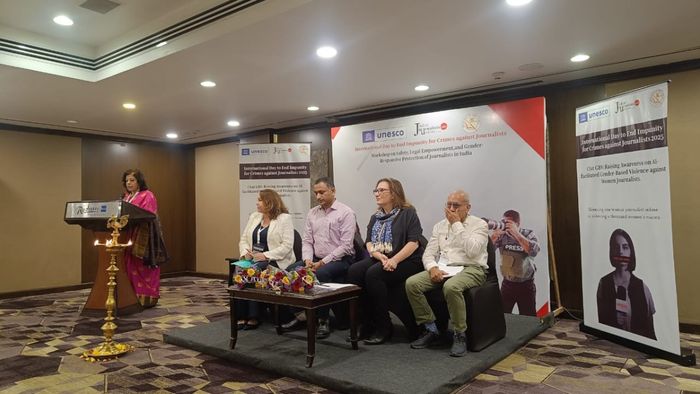UNESCO workshop in Bengaluru calls for stronger protection and gender-safe environment for journalists
A three-day workshop on “Safety, Legal Empowerment, and Gender-Responsive Protection of Journalists in India” began in Bengaluru this week, jointly organised by UNESCO, the Indian Journalists Union (IJU), and the Karnataka Union of Working Journalists (KUWJ).

- Nov 11, 2025,
- Updated Nov 11, 2025, 5:54 PM IST
A three-day workshop on “Safety, Legal Empowerment, and Gender-Responsive Protection of Journalists in India” began in Bengaluru this week, jointly organized by UNESCO, the Indian Journalists Union (IJU), and the Karnataka Union of Working Journalists (KUWJ).
The event marked the observance of the International Day to End Impunity for Crimes Against Journalists (IDEI) and brought together journalists, UN officials, and media associations from across the country.
The workshop focuses on the increasing safety challenges faced by journalists, especially women, in an era dominated by digital and AI-driven technology. Discussions centred on legal empowerment, gender-sensitive protection mechanisms, and fostering solidarity within the media fraternity.
In her keynote address, Ma’aly Hazzaz, Chief and Regional Advisor for Communication and Information at UNESCO’s South Asia Office, emphasized that journalists are the backbone of democratic societies, acting as conduits between citizens and the world of information. Referring to this year’s IDEI theme, CHAT GBV—which highlights AI-facilitated gender-based violence—Hazzaz warned that women journalists are facing growing threats through online harassment, surveillance, and deepfake technology.
“These technology-driven attacks not only endanger individual safety but also erode the integrity and diversity of information essential to democracy,” she said. Hazzaz reaffirmed UNESCO’s commitment to journalist safety as a UN priority and underscored the dual role of AI as both a challenge and a potential tool for early threat detection and fact-checking.
Aida Mortirous-Nejad, Human Rights Officer at the Office of the UN High Commissioner for Human Rights (OHCHR), called India’s free press a cornerstone of its democracy while expressing alarm over the rise in global violence against journalists. She cited UN data showing that more than 1,000 journalists have been killed in the past decade, with impunity prevailing in nine out of ten cases. “Impunity fuels further violence and weakens freedom of expression,” she said.
Mortirous-Nejad drew attention to gender-based harassment, including sexual violence and AI-generated deepfake campaigns targeting women journalists, warning that such attacks silence critical voices and diminish media diversity. She reminded that states have a legal obligation to prevent and prosecute all forms of attacks against journalists and urged tech companies to ensure accountability for abuses on their platforms.
Highlighting India’s international commitments, she noted that the UN Human Rights Committee recently recommended India to ensure prompt and independent investigations into violations against journalists. She added that the UN’s Plan of Action on the Safety of Journalists aims to strengthen cooperation among governments, media, and civil society to safeguard press freedom.
Geetartha Pathak, President of the Indian Journalists Union, delivered a stirring speech urging collective resolve to end impunity for crimes against journalists. “Today is not a day of mourning, but a day of resolve — a day to reaffirm that the truth shall not be silenced,” he said. Pathak reminded that freedom of speech under Article 19 of the Constitution is not just a journalist’s right but the people’s right to know.
Condemning the misuse of stringent laws like the UAPA, online harassment, and surveillance, Pathak stated, “Security cannot be an excuse for silence. When journalism is attacked, the republic is attacked.” He called for dedicated investigation units, public case-tracking systems, and mandatory police sensitization on press freedom.
On gender-responsive safety, Pathak said, “Women do not need protection from journalism—they need protection to do journalism.” He announced plans for a national legal safety helpline, state-level defense panels, and a gender-sensitive newsroom safety charter. “This is not a declaration of intention; this is a plan of action,” he added.
Representing Sikkim, Sujal Pradhan, Correspondent for India Today NE and President of the Journalists Union of Sikkim, also participated in the workshop, which is set to conclude with a roadmap for enhancing legal, institutional, and gender-based protection for journalists across India.